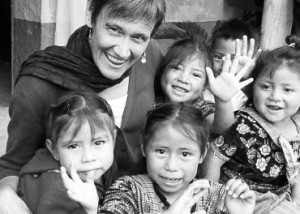I have been a student of poverty for over three decades. Through traveling to Mexico on youth service trips, working with children and homeless populations in the inner cities of the US, studying formally at the graduate level, running a fair trade venture and now a nonprofit organization, my eyes have been opened.
I have come to see that the opposite of poverty is not wealth but justice – equal opportunity for all.
In Guatemala, the country in which Reading Village has begun its work, if you are a wealthy white male child, you are valued. Opportunities are thrown at you. You will attend fully-resourced schools, grow up literate, and may even attend college here in the United States. But if you are an impoverished, indigenous Maya girl, you have only a 30% chance of even knowing how to read or write. You don’t have any opportunities in front of you and will end up just as poor or poorer than your parents because you are deemed inconsequential by a corrupt and racist government and society.
My vision for the world is that every child has the opportunity to fulfill his or her potential. I believe this so deeply that I have dedicated the last 10 years of my life to building an organization that is breaking the cycle of intergenerational poverty in Guatemala. Our approach focuses on childhood literacy, youth leadership and education as leverage points for creating opportunity for marginalized and impoverished peoples so they can fulfill their potential and determine their own futures.
At the center of our model is youth leadership. Reading Village empowers teens to eradicate illiteracy and lead their communities toward self-sufficiency. In the communities we partner with only 10% of students reach high school. In Guatemala, public school is not free, and the cost to send one child to high school for one year is often more than half of a family’s annual income. In light of this injustice, Reading Village provides teenagers with high school scholarships, but that’s only our starting point.
These teens participate in rigorous and routine mentoring and leadership development during the course of those four years. Our leadership curriculum helps the teens see the social, political and economic systems that keep their communities impoverished. Most importantly, our youth leaders practice their leadership skills by reading for at least three hours every week to the younger children in their communities. In this way, one generation of leaders is building another generation of readers – the combination of which we have found to be potent enough to interrupt poverty.
In an educational system that teaches through rote memorization and copying, copying, copying, we now have a generation of children – for whom Spanish is their second language – growing up not only literate, but also with strong critical and creative thinking skills. Our program is not only improving comprehension but also developing the love and habit of reading in the young children our teens work with. And when a teen sees that she can have that kind of impact – when Olga hears a child yell across the field to her, “Olga, Olga read me a story!” – her self-identity jumps from unseen teen to proud contributor to her community’s future.
And that’s when the change really happens.
We’ve always said we don’t build schools or libraries but rather we help develop local leaders who, if they choose, will build for themselves what they need.
This belief was confirmed when just two years into the program the teens informed us of their decision to open a library and took the initiative to do so! In Concepcion the first-ever community library is now in operation – and another in Chuacruz as well. This is the manifestation of the untapped potential that rises up when opportunity is presented.
We have been around long enough now that we have a growing community of alumni. We’re proud of the fact that 78% of our graduates are employed, many in professions such as teaching, nursing and bookkeeping. These young adults have salaries that equal or exceed the entire income of their family households when they entered our program. And 40% are studying at university.
This year marks our 10th anniversary. We are currently have 68 students under scholarship in our six pilot villages reading to 3,400 children and running two libraries. Among our alumni we have two teaching fellows who are preparing to return to their communities to open their own schools and transform local education systems. And now that we know we have a model that works, we are preparing to scale our program throughout Guatemala and beyond.
Linda Smith has a background in education, public health, entrepreneurship, fair trade, business development and community sustainability. She has been connected to Guatemala since 1988. She earned an MBA and MA in Latin American Studies from UCLA. Today, Linda is the Founder & Executive Director of Reading Village (www.readingvillage.org).

